PSY391 - Individual Differences: Personality Traits & Performance
VerifiedAdded on 2023/04/22
|11
|1853
|449
Report
AI Summary
This report investigates the relationship between personality traits and academic performance, focusing on individual differences between students from Perth and Singapore. The study employs an independent samples t-test to compare the means of agreeableness, conscientiousness, openness, extraversion, and neuroticism between the two groups. Results indicate significant differences in agreeableness, conscientiousness, and openness, with Perth students generally scoring higher. The report further explores the facets of these traits, suggesting that Perth students are more likely to exhibit characteristics such as altruism, vigilance, and a strong sense of aesthetics. The analysis also discusses the correlation between academic level and personality traits, highlighting the importance of conscientiousness in predicting academic performance at the tertiary level. Finally, the report considers validity factors such as GPA, intelligence, and conscientiousness in assessing the relationship between personality traits and academic outcomes. Desklib provides access to this and other solved assignments for students' educational needs.
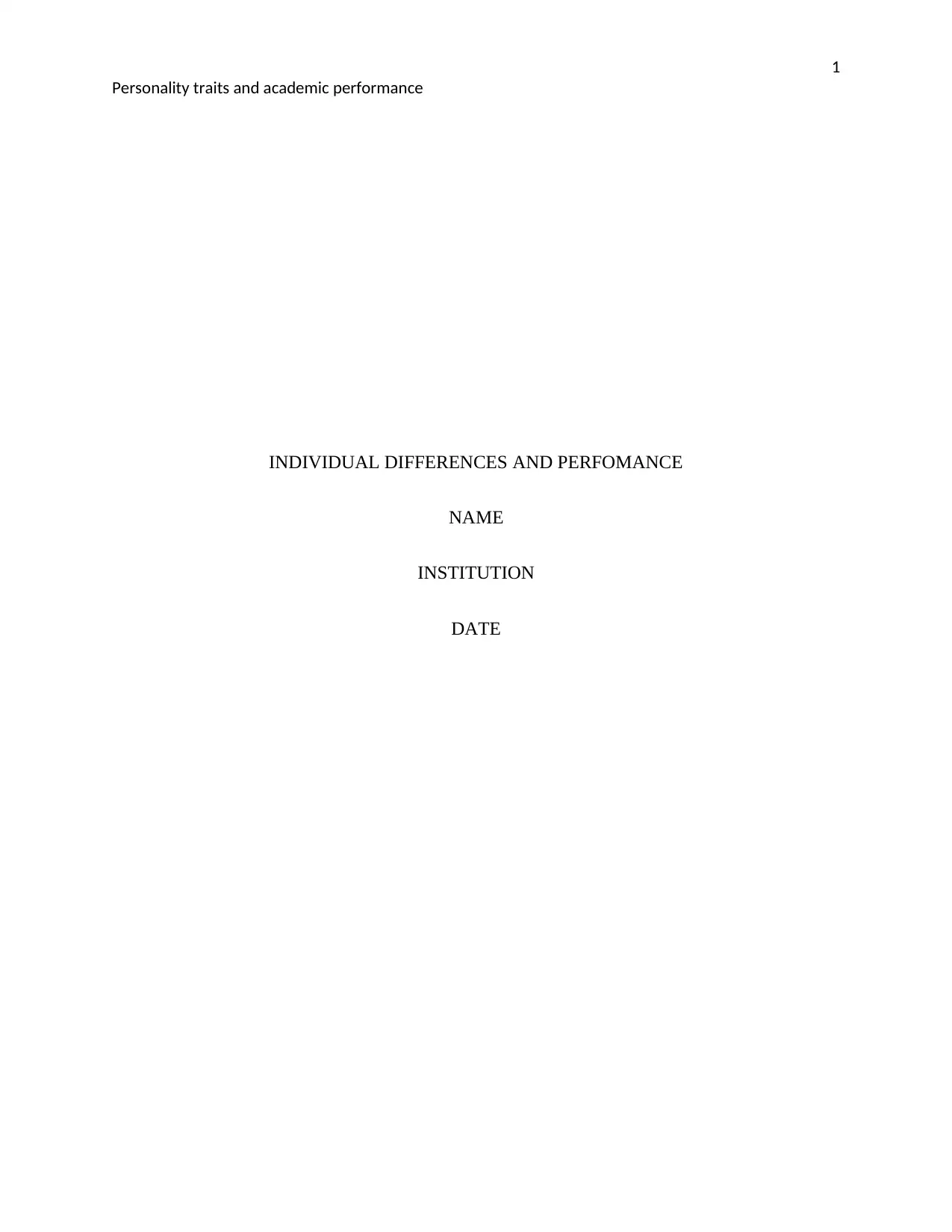
1
Personality traits and academic performance
INDIVIDUAL DIFFERENCES AND PERFOMANCE
NAME
INSTITUTION
DATE
Personality traits and academic performance
INDIVIDUAL DIFFERENCES AND PERFOMANCE
NAME
INSTITUTION
DATE
Paraphrase This Document
Need a fresh take? Get an instant paraphrase of this document with our AI Paraphraser
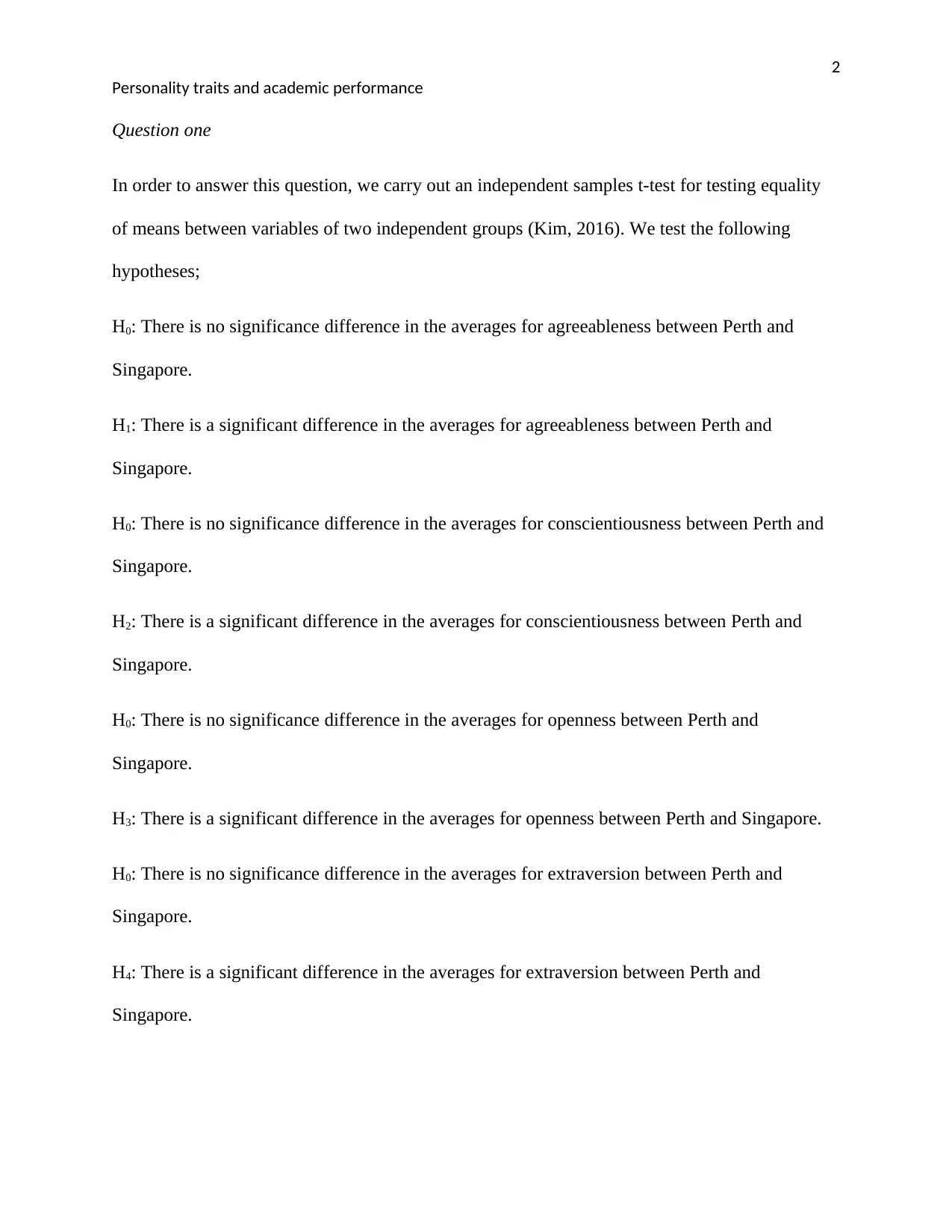
2
Personality traits and academic performance
Question one
In order to answer this question, we carry out an independent samples t-test for testing equality
of means between variables of two independent groups (Kim, 2016). We test the following
hypotheses;
H0: There is no significance difference in the averages for agreeableness between Perth and
Singapore.
H1: There is a significant difference in the averages for agreeableness between Perth and
Singapore.
H0: There is no significance difference in the averages for conscientiousness between Perth and
Singapore.
H2: There is a significant difference in the averages for conscientiousness between Perth and
Singapore.
H0: There is no significance difference in the averages for openness between Perth and
Singapore.
H3: There is a significant difference in the averages for openness between Perth and Singapore.
H0: There is no significance difference in the averages for extraversion between Perth and
Singapore.
H4: There is a significant difference in the averages for extraversion between Perth and
Singapore.
Personality traits and academic performance
Question one
In order to answer this question, we carry out an independent samples t-test for testing equality
of means between variables of two independent groups (Kim, 2016). We test the following
hypotheses;
H0: There is no significance difference in the averages for agreeableness between Perth and
Singapore.
H1: There is a significant difference in the averages for agreeableness between Perth and
Singapore.
H0: There is no significance difference in the averages for conscientiousness between Perth and
Singapore.
H2: There is a significant difference in the averages for conscientiousness between Perth and
Singapore.
H0: There is no significance difference in the averages for openness between Perth and
Singapore.
H3: There is a significant difference in the averages for openness between Perth and Singapore.
H0: There is no significance difference in the averages for extraversion between Perth and
Singapore.
H4: There is a significant difference in the averages for extraversion between Perth and
Singapore.
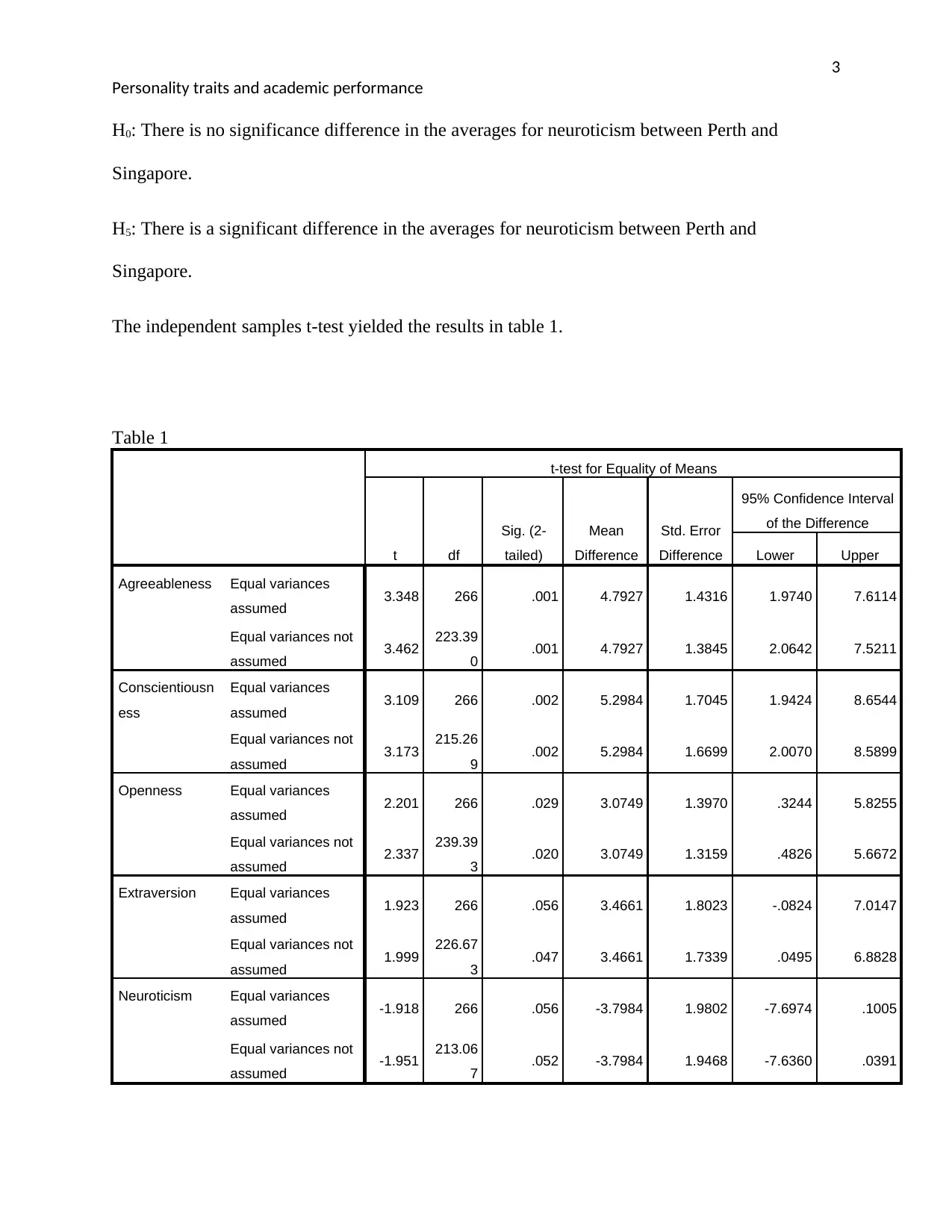
3
Personality traits and academic performance
H0: There is no significance difference in the averages for neuroticism between Perth and
Singapore.
H5: There is a significant difference in the averages for neuroticism between Perth and
Singapore.
The independent samples t-test yielded the results in table 1.
Table 1
t-test for Equality of Means
t df
Sig. (2-
tailed)
Mean
Difference
Std. Error
Difference
95% Confidence Interval
of the Difference
Lower Upper
Agreeableness Equal variances
assumed 3.348 266 .001 4.7927 1.4316 1.9740 7.6114
Equal variances not
assumed 3.462 223.39
0 .001 4.7927 1.3845 2.0642 7.5211
Conscientiousn
ess
Equal variances
assumed 3.109 266 .002 5.2984 1.7045 1.9424 8.6544
Equal variances not
assumed 3.173 215.26
9 .002 5.2984 1.6699 2.0070 8.5899
Openness Equal variances
assumed 2.201 266 .029 3.0749 1.3970 .3244 5.8255
Equal variances not
assumed 2.337 239.39
3 .020 3.0749 1.3159 .4826 5.6672
Extraversion Equal variances
assumed 1.923 266 .056 3.4661 1.8023 -.0824 7.0147
Equal variances not
assumed 1.999 226.67
3 .047 3.4661 1.7339 .0495 6.8828
Neuroticism Equal variances
assumed -1.918 266 .056 -3.7984 1.9802 -7.6974 .1005
Equal variances not
assumed -1.951 213.06
7 .052 -3.7984 1.9468 -7.6360 .0391
Personality traits and academic performance
H0: There is no significance difference in the averages for neuroticism between Perth and
Singapore.
H5: There is a significant difference in the averages for neuroticism between Perth and
Singapore.
The independent samples t-test yielded the results in table 1.
Table 1
t-test for Equality of Means
t df
Sig. (2-
tailed)
Mean
Difference
Std. Error
Difference
95% Confidence Interval
of the Difference
Lower Upper
Agreeableness Equal variances
assumed 3.348 266 .001 4.7927 1.4316 1.9740 7.6114
Equal variances not
assumed 3.462 223.39
0 .001 4.7927 1.3845 2.0642 7.5211
Conscientiousn
ess
Equal variances
assumed 3.109 266 .002 5.2984 1.7045 1.9424 8.6544
Equal variances not
assumed 3.173 215.26
9 .002 5.2984 1.6699 2.0070 8.5899
Openness Equal variances
assumed 2.201 266 .029 3.0749 1.3970 .3244 5.8255
Equal variances not
assumed 2.337 239.39
3 .020 3.0749 1.3159 .4826 5.6672
Extraversion Equal variances
assumed 1.923 266 .056 3.4661 1.8023 -.0824 7.0147
Equal variances not
assumed 1.999 226.67
3 .047 3.4661 1.7339 .0495 6.8828
Neuroticism Equal variances
assumed -1.918 266 .056 -3.7984 1.9802 -7.6974 .1005
Equal variances not
assumed -1.951 213.06
7 .052 -3.7984 1.9468 -7.6360 .0391
⊘ This is a preview!⊘
Do you want full access?
Subscribe today to unlock all pages.

Trusted by 1+ million students worldwide
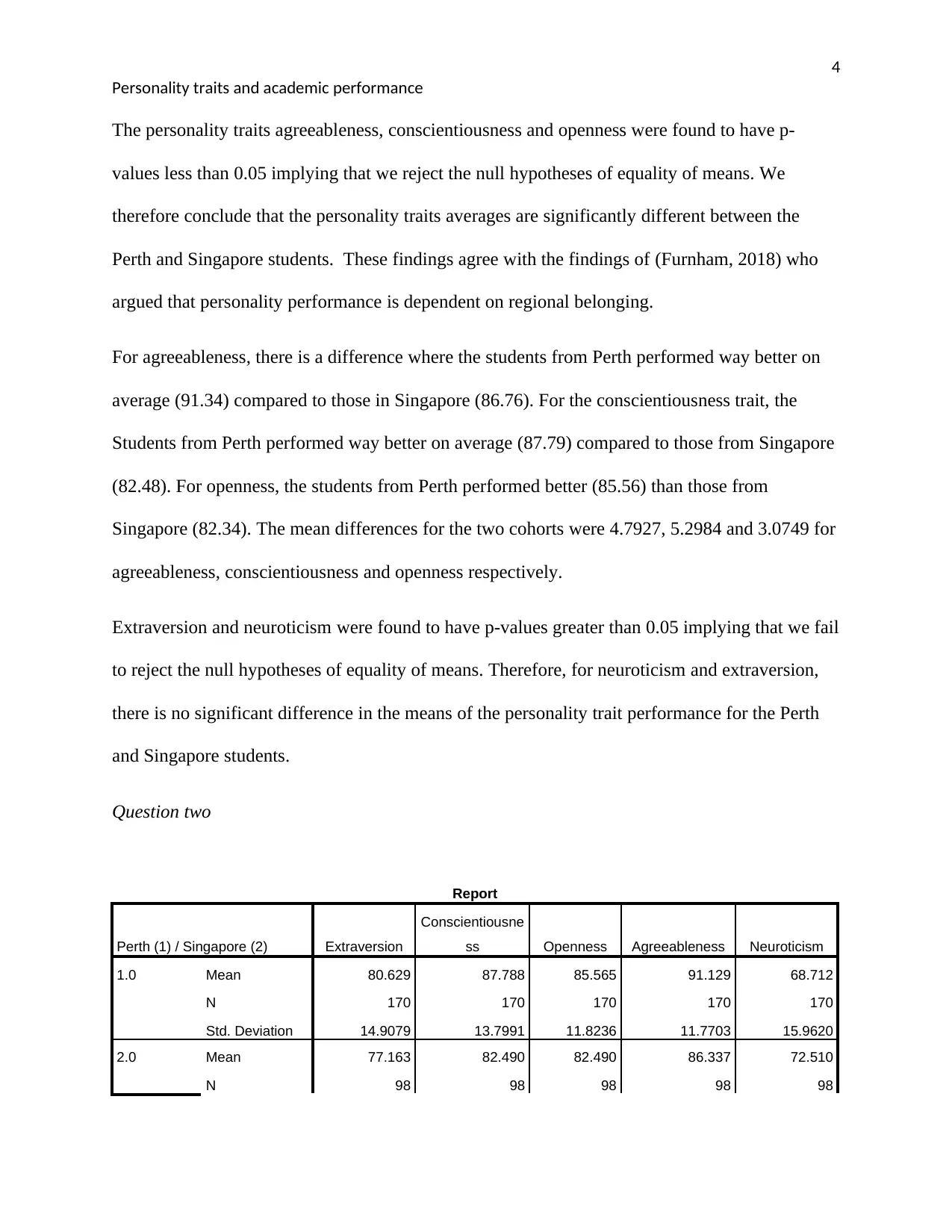
4
Personality traits and academic performance
The personality traits agreeableness, conscientiousness and openness were found to have p-
values less than 0.05 implying that we reject the null hypotheses of equality of means. We
therefore conclude that the personality traits averages are significantly different between the
Perth and Singapore students. These findings agree with the findings of (Furnham, 2018) who
argued that personality performance is dependent on regional belonging.
For agreeableness, there is a difference where the students from Perth performed way better on
average (91.34) compared to those in Singapore (86.76). For the conscientiousness trait, the
Students from Perth performed way better on average (87.79) compared to those from Singapore
(82.48). For openness, the students from Perth performed better (85.56) than those from
Singapore (82.34). The mean differences for the two cohorts were 4.7927, 5.2984 and 3.0749 for
agreeableness, conscientiousness and openness respectively.
Extraversion and neuroticism were found to have p-values greater than 0.05 implying that we fail
to reject the null hypotheses of equality of means. Therefore, for neuroticism and extraversion,
there is no significant difference in the means of the personality trait performance for the Perth
and Singapore students.
Question two
Report
Perth (1) / Singapore (2) Extraversion
Conscientiousne
ss Openness Agreeableness Neuroticism
1.0 Mean 80.629 87.788 85.565 91.129 68.712
N 170 170 170 170 170
Std. Deviation 14.9079 13.7991 11.8236 11.7703 15.9620
2.0 Mean 77.163 82.490 82.490 86.337 72.510
N 98 98 98 98 98
Personality traits and academic performance
The personality traits agreeableness, conscientiousness and openness were found to have p-
values less than 0.05 implying that we reject the null hypotheses of equality of means. We
therefore conclude that the personality traits averages are significantly different between the
Perth and Singapore students. These findings agree with the findings of (Furnham, 2018) who
argued that personality performance is dependent on regional belonging.
For agreeableness, there is a difference where the students from Perth performed way better on
average (91.34) compared to those in Singapore (86.76). For the conscientiousness trait, the
Students from Perth performed way better on average (87.79) compared to those from Singapore
(82.48). For openness, the students from Perth performed better (85.56) than those from
Singapore (82.34). The mean differences for the two cohorts were 4.7927, 5.2984 and 3.0749 for
agreeableness, conscientiousness and openness respectively.
Extraversion and neuroticism were found to have p-values greater than 0.05 implying that we fail
to reject the null hypotheses of equality of means. Therefore, for neuroticism and extraversion,
there is no significant difference in the means of the personality trait performance for the Perth
and Singapore students.
Question two
Report
Perth (1) / Singapore (2) Extraversion
Conscientiousne
ss Openness Agreeableness Neuroticism
1.0 Mean 80.629 87.788 85.565 91.129 68.712
N 170 170 170 170 170
Std. Deviation 14.9079 13.7991 11.8236 11.7703 15.9620
2.0 Mean 77.163 82.490 82.490 86.337 72.510
N 98 98 98 98 98
Paraphrase This Document
Need a fresh take? Get an instant paraphrase of this document with our AI Paraphraser
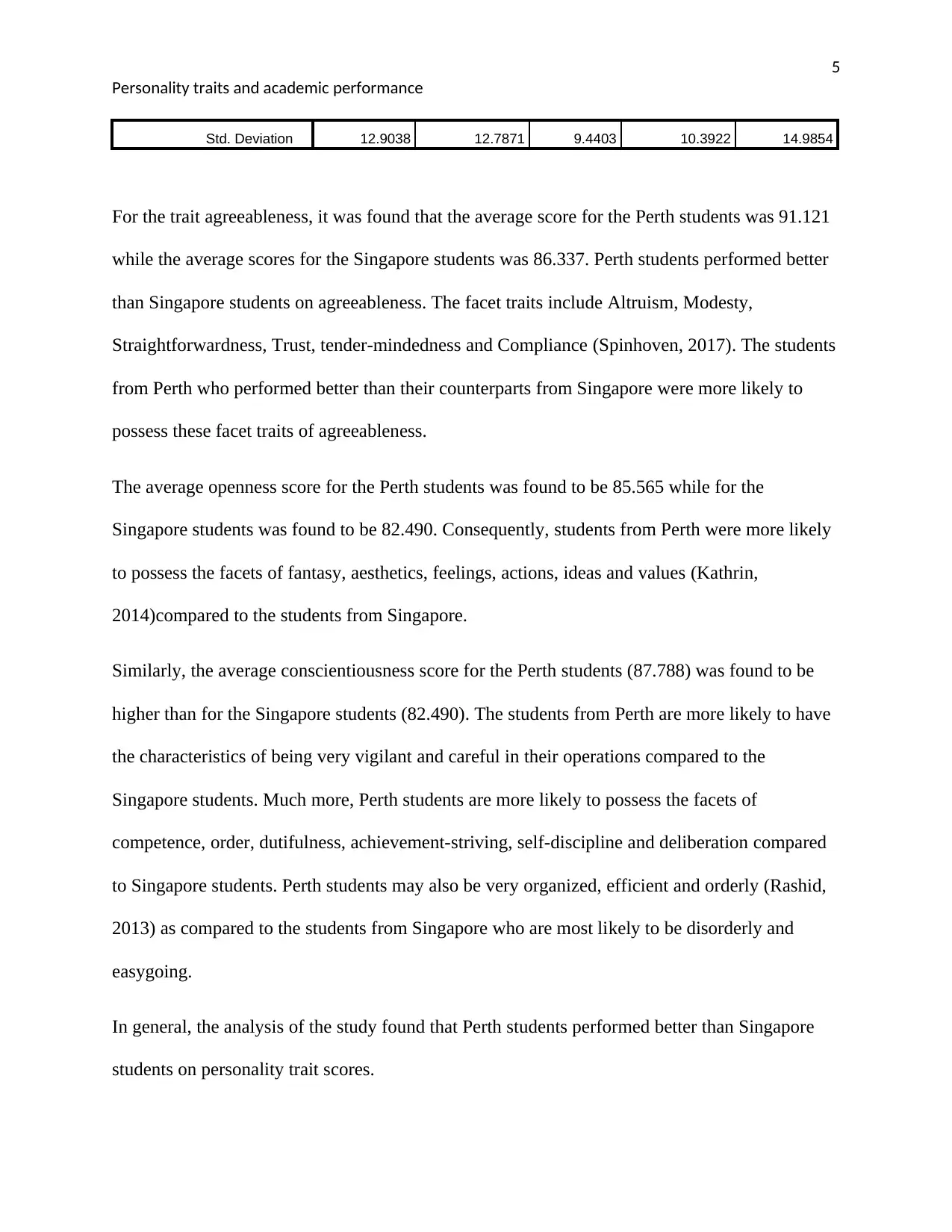
5
Personality traits and academic performance
Std. Deviation 12.9038 12.7871 9.4403 10.3922 14.9854
For the trait agreeableness, it was found that the average score for the Perth students was 91.121
while the average scores for the Singapore students was 86.337. Perth students performed better
than Singapore students on agreeableness. The facet traits include Altruism, Modesty,
Straightforwardness, Trust, tender-mindedness and Compliance (Spinhoven, 2017). The students
from Perth who performed better than their counterparts from Singapore were more likely to
possess these facet traits of agreeableness.
The average openness score for the Perth students was found to be 85.565 while for the
Singapore students was found to be 82.490. Consequently, students from Perth were more likely
to possess the facets of fantasy, aesthetics, feelings, actions, ideas and values (Kathrin,
2014)compared to the students from Singapore.
Similarly, the average conscientiousness score for the Perth students (87.788) was found to be
higher than for the Singapore students (82.490). The students from Perth are more likely to have
the characteristics of being very vigilant and careful in their operations compared to the
Singapore students. Much more, Perth students are more likely to possess the facets of
competence, order, dutifulness, achievement-striving, self-discipline and deliberation compared
to Singapore students. Perth students may also be very organized, efficient and orderly (Rashid,
2013) as compared to the students from Singapore who are most likely to be disorderly and
easygoing.
In general, the analysis of the study found that Perth students performed better than Singapore
students on personality trait scores.
Personality traits and academic performance
Std. Deviation 12.9038 12.7871 9.4403 10.3922 14.9854
For the trait agreeableness, it was found that the average score for the Perth students was 91.121
while the average scores for the Singapore students was 86.337. Perth students performed better
than Singapore students on agreeableness. The facet traits include Altruism, Modesty,
Straightforwardness, Trust, tender-mindedness and Compliance (Spinhoven, 2017). The students
from Perth who performed better than their counterparts from Singapore were more likely to
possess these facet traits of agreeableness.
The average openness score for the Perth students was found to be 85.565 while for the
Singapore students was found to be 82.490. Consequently, students from Perth were more likely
to possess the facets of fantasy, aesthetics, feelings, actions, ideas and values (Kathrin,
2014)compared to the students from Singapore.
Similarly, the average conscientiousness score for the Perth students (87.788) was found to be
higher than for the Singapore students (82.490). The students from Perth are more likely to have
the characteristics of being very vigilant and careful in their operations compared to the
Singapore students. Much more, Perth students are more likely to possess the facets of
competence, order, dutifulness, achievement-striving, self-discipline and deliberation compared
to Singapore students. Perth students may also be very organized, efficient and orderly (Rashid,
2013) as compared to the students from Singapore who are most likely to be disorderly and
easygoing.
In general, the analysis of the study found that Perth students performed better than Singapore
students on personality trait scores.
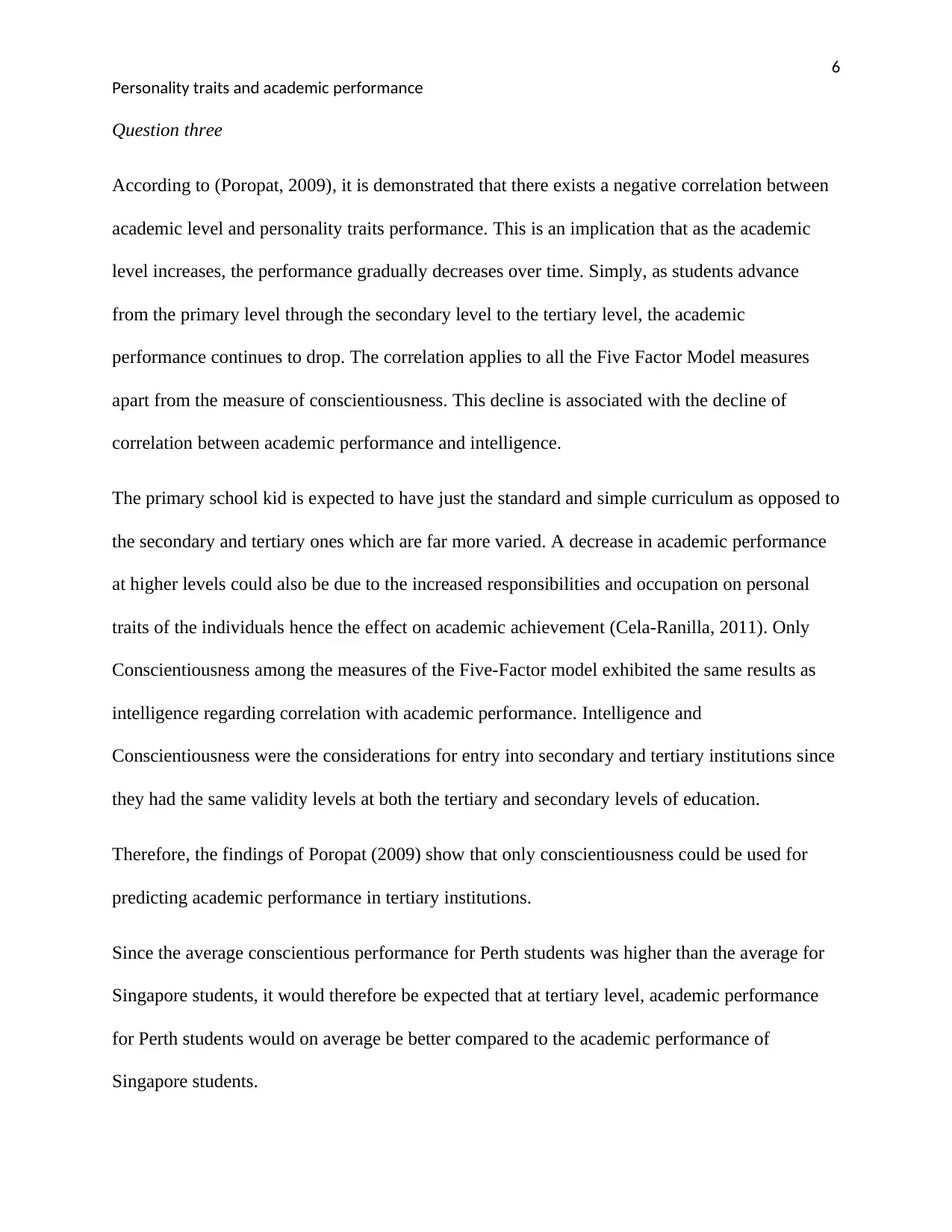
6
Personality traits and academic performance
Question three
According to (Poropat, 2009), it is demonstrated that there exists a negative correlation between
academic level and personality traits performance. This is an implication that as the academic
level increases, the performance gradually decreases over time. Simply, as students advance
from the primary level through the secondary level to the tertiary level, the academic
performance continues to drop. The correlation applies to all the Five Factor Model measures
apart from the measure of conscientiousness. This decline is associated with the decline of
correlation between academic performance and intelligence.
The primary school kid is expected to have just the standard and simple curriculum as opposed to
the secondary and tertiary ones which are far more varied. A decrease in academic performance
at higher levels could also be due to the increased responsibilities and occupation on personal
traits of the individuals hence the effect on academic achievement (Cela-Ranilla, 2011). Only
Conscientiousness among the measures of the Five-Factor model exhibited the same results as
intelligence regarding correlation with academic performance. Intelligence and
Conscientiousness were the considerations for entry into secondary and tertiary institutions since
they had the same validity levels at both the tertiary and secondary levels of education.
Therefore, the findings of Poropat (2009) show that only conscientiousness could be used for
predicting academic performance in tertiary institutions.
Since the average conscientious performance for Perth students was higher than the average for
Singapore students, it would therefore be expected that at tertiary level, academic performance
for Perth students would on average be better compared to the academic performance of
Singapore students.
Personality traits and academic performance
Question three
According to (Poropat, 2009), it is demonstrated that there exists a negative correlation between
academic level and personality traits performance. This is an implication that as the academic
level increases, the performance gradually decreases over time. Simply, as students advance
from the primary level through the secondary level to the tertiary level, the academic
performance continues to drop. The correlation applies to all the Five Factor Model measures
apart from the measure of conscientiousness. This decline is associated with the decline of
correlation between academic performance and intelligence.
The primary school kid is expected to have just the standard and simple curriculum as opposed to
the secondary and tertiary ones which are far more varied. A decrease in academic performance
at higher levels could also be due to the increased responsibilities and occupation on personal
traits of the individuals hence the effect on academic achievement (Cela-Ranilla, 2011). Only
Conscientiousness among the measures of the Five-Factor model exhibited the same results as
intelligence regarding correlation with academic performance. Intelligence and
Conscientiousness were the considerations for entry into secondary and tertiary institutions since
they had the same validity levels at both the tertiary and secondary levels of education.
Therefore, the findings of Poropat (2009) show that only conscientiousness could be used for
predicting academic performance in tertiary institutions.
Since the average conscientious performance for Perth students was higher than the average for
Singapore students, it would therefore be expected that at tertiary level, academic performance
for Perth students would on average be better compared to the academic performance of
Singapore students.
⊘ This is a preview!⊘
Do you want full access?
Subscribe today to unlock all pages.

Trusted by 1+ million students worldwide
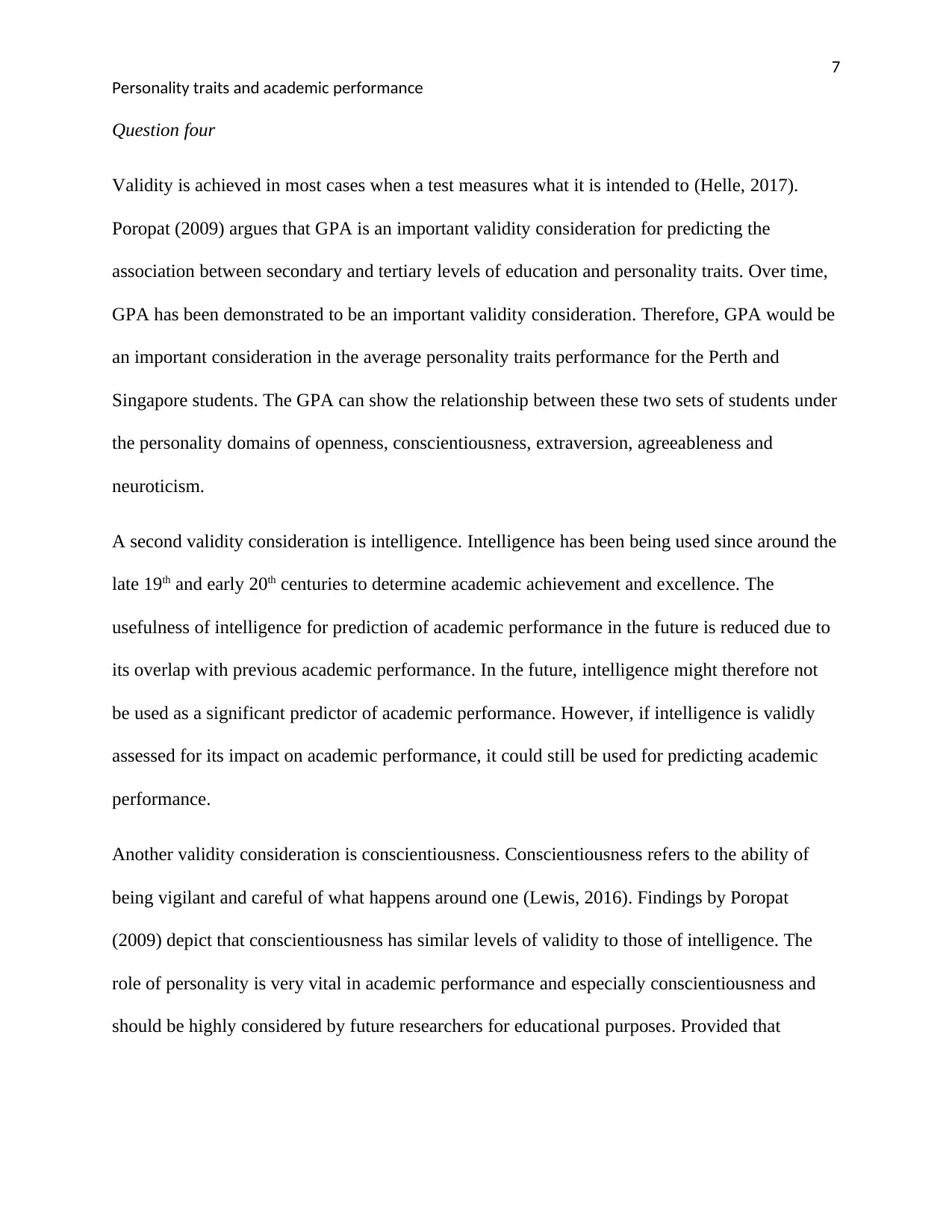
7
Personality traits and academic performance
Question four
Validity is achieved in most cases when a test measures what it is intended to (Helle, 2017).
Poropat (2009) argues that GPA is an important validity consideration for predicting the
association between secondary and tertiary levels of education and personality traits. Over time,
GPA has been demonstrated to be an important validity consideration. Therefore, GPA would be
an important consideration in the average personality traits performance for the Perth and
Singapore students. The GPA can show the relationship between these two sets of students under
the personality domains of openness, conscientiousness, extraversion, agreeableness and
neuroticism.
A second validity consideration is intelligence. Intelligence has been being used since around the
late 19th and early 20th centuries to determine academic achievement and excellence. The
usefulness of intelligence for prediction of academic performance in the future is reduced due to
its overlap with previous academic performance. In the future, intelligence might therefore not
be used as a significant predictor of academic performance. However, if intelligence is validly
assessed for its impact on academic performance, it could still be used for predicting academic
performance.
Another validity consideration is conscientiousness. Conscientiousness refers to the ability of
being vigilant and careful of what happens around one (Lewis, 2016). Findings by Poropat
(2009) depict that conscientiousness has similar levels of validity to those of intelligence. The
role of personality is very vital in academic performance and especially conscientiousness and
should be highly considered by future researchers for educational purposes. Provided that
Personality traits and academic performance
Question four
Validity is achieved in most cases when a test measures what it is intended to (Helle, 2017).
Poropat (2009) argues that GPA is an important validity consideration for predicting the
association between secondary and tertiary levels of education and personality traits. Over time,
GPA has been demonstrated to be an important validity consideration. Therefore, GPA would be
an important consideration in the average personality traits performance for the Perth and
Singapore students. The GPA can show the relationship between these two sets of students under
the personality domains of openness, conscientiousness, extraversion, agreeableness and
neuroticism.
A second validity consideration is intelligence. Intelligence has been being used since around the
late 19th and early 20th centuries to determine academic achievement and excellence. The
usefulness of intelligence for prediction of academic performance in the future is reduced due to
its overlap with previous academic performance. In the future, intelligence might therefore not
be used as a significant predictor of academic performance. However, if intelligence is validly
assessed for its impact on academic performance, it could still be used for predicting academic
performance.
Another validity consideration is conscientiousness. Conscientiousness refers to the ability of
being vigilant and careful of what happens around one (Lewis, 2016). Findings by Poropat
(2009) depict that conscientiousness has similar levels of validity to those of intelligence. The
role of personality is very vital in academic performance and especially conscientiousness and
should be highly considered by future researchers for educational purposes. Provided that
Paraphrase This Document
Need a fresh take? Get an instant paraphrase of this document with our AI Paraphraser
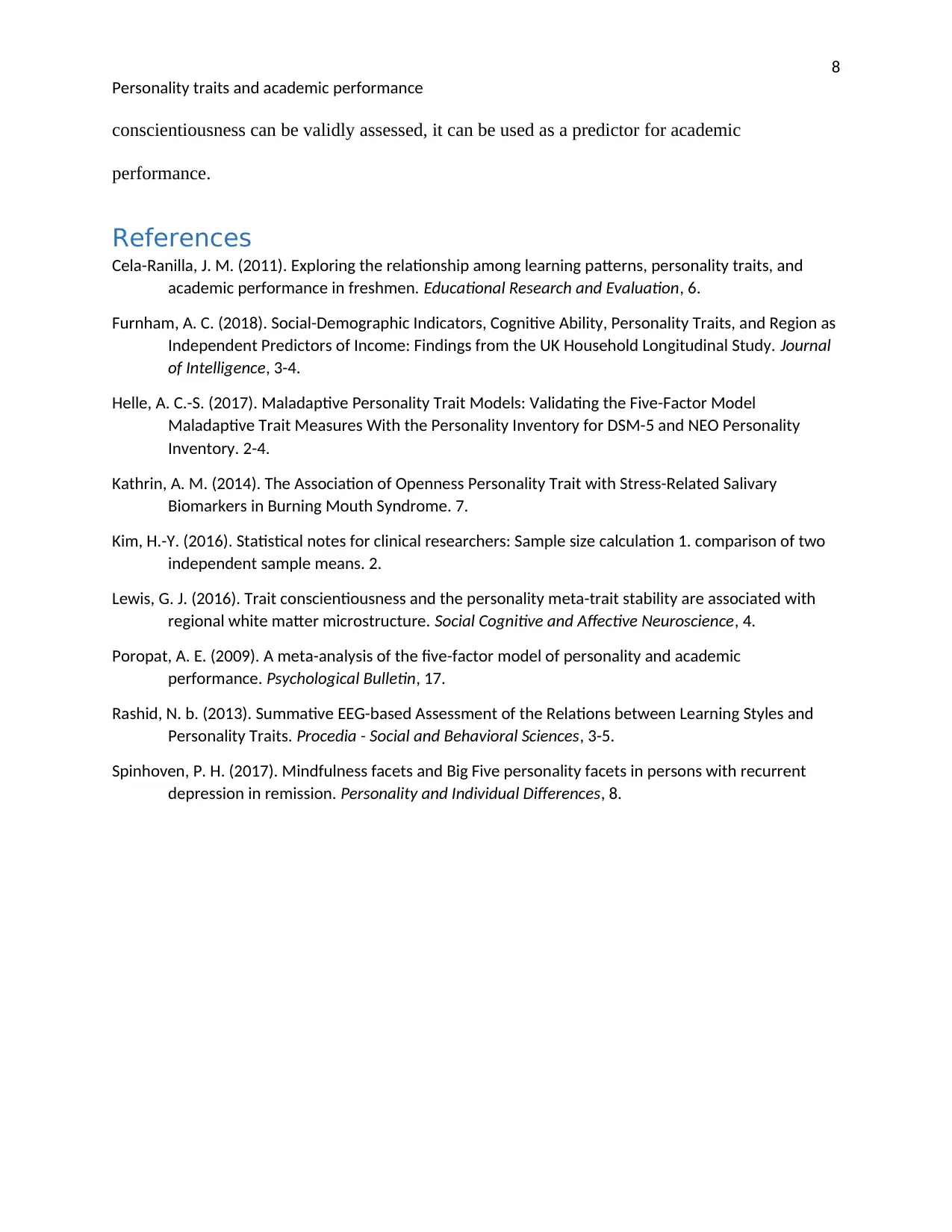
8
Personality traits and academic performance
conscientiousness can be validly assessed, it can be used as a predictor for academic
performance.
References
Cela-Ranilla, J. M. (2011). Exploring the relationship among learning patterns, personality traits, and
academic performance in freshmen. Educational Research and Evaluation, 6.
Furnham, A. C. (2018). Social-Demographic Indicators, Cognitive Ability, Personality Traits, and Region as
Independent Predictors of Income: Findings from the UK Household Longitudinal Study. Journal
of Intelligence, 3-4.
Helle, A. C.-S. (2017). Maladaptive Personality Trait Models: Validating the Five-Factor Model
Maladaptive Trait Measures With the Personality Inventory for DSM-5 and NEO Personality
Inventory. 2-4.
Kathrin, A. M. (2014). The Association of Openness Personality Trait with Stress-Related Salivary
Biomarkers in Burning Mouth Syndrome. 7.
Kim, H.-Y. (2016). Statistical notes for clinical researchers: Sample size calculation 1. comparison of two
independent sample means. 2.
Lewis, G. J. (2016). Trait conscientiousness and the personality meta-trait stability are associated with
regional white matter microstructure. Social Cognitive and Affective Neuroscience, 4.
Poropat, A. E. (2009). A meta-analysis of the five-factor model of personality and academic
performance. Psychological Bulletin, 17.
Rashid, N. b. (2013). Summative EEG-based Assessment of the Relations between Learning Styles and
Personality Traits. Procedia - Social and Behavioral Sciences, 3-5.
Spinhoven, P. H. (2017). Mindfulness facets and Big Five personality facets in persons with recurrent
depression in remission. Personality and Individual Differences, 8.
Personality traits and academic performance
conscientiousness can be validly assessed, it can be used as a predictor for academic
performance.
References
Cela-Ranilla, J. M. (2011). Exploring the relationship among learning patterns, personality traits, and
academic performance in freshmen. Educational Research and Evaluation, 6.
Furnham, A. C. (2018). Social-Demographic Indicators, Cognitive Ability, Personality Traits, and Region as
Independent Predictors of Income: Findings from the UK Household Longitudinal Study. Journal
of Intelligence, 3-4.
Helle, A. C.-S. (2017). Maladaptive Personality Trait Models: Validating the Five-Factor Model
Maladaptive Trait Measures With the Personality Inventory for DSM-5 and NEO Personality
Inventory. 2-4.
Kathrin, A. M. (2014). The Association of Openness Personality Trait with Stress-Related Salivary
Biomarkers in Burning Mouth Syndrome. 7.
Kim, H.-Y. (2016). Statistical notes for clinical researchers: Sample size calculation 1. comparison of two
independent sample means. 2.
Lewis, G. J. (2016). Trait conscientiousness and the personality meta-trait stability are associated with
regional white matter microstructure. Social Cognitive and Affective Neuroscience, 4.
Poropat, A. E. (2009). A meta-analysis of the five-factor model of personality and academic
performance. Psychological Bulletin, 17.
Rashid, N. b. (2013). Summative EEG-based Assessment of the Relations between Learning Styles and
Personality Traits. Procedia - Social and Behavioral Sciences, 3-5.
Spinhoven, P. H. (2017). Mindfulness facets and Big Five personality facets in persons with recurrent
depression in remission. Personality and Individual Differences, 8.
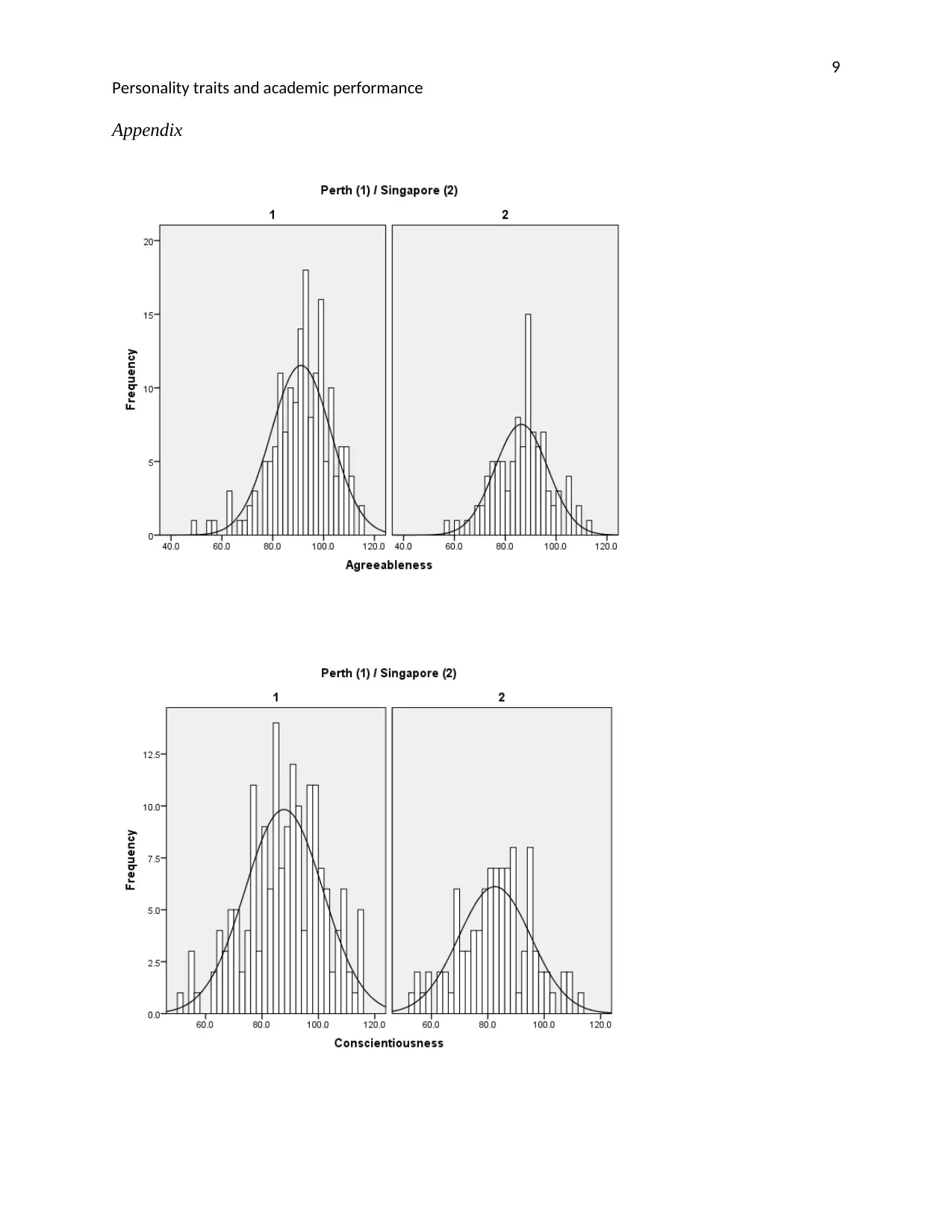
9
Personality traits and academic performance
Appendix
Personality traits and academic performance
Appendix
⊘ This is a preview!⊘
Do you want full access?
Subscribe today to unlock all pages.

Trusted by 1+ million students worldwide
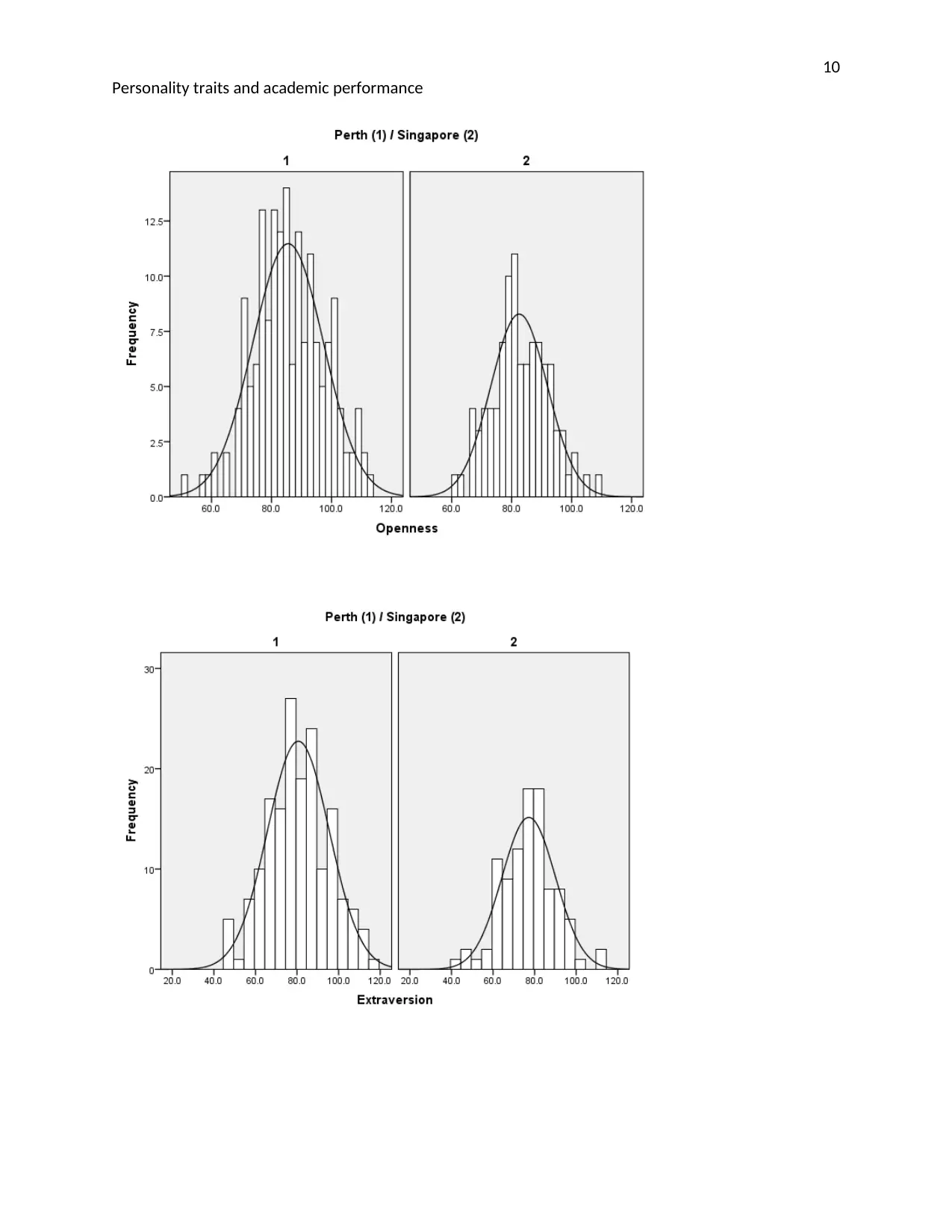
10
Personality traits and academic performance
Personality traits and academic performance
Paraphrase This Document
Need a fresh take? Get an instant paraphrase of this document with our AI Paraphraser
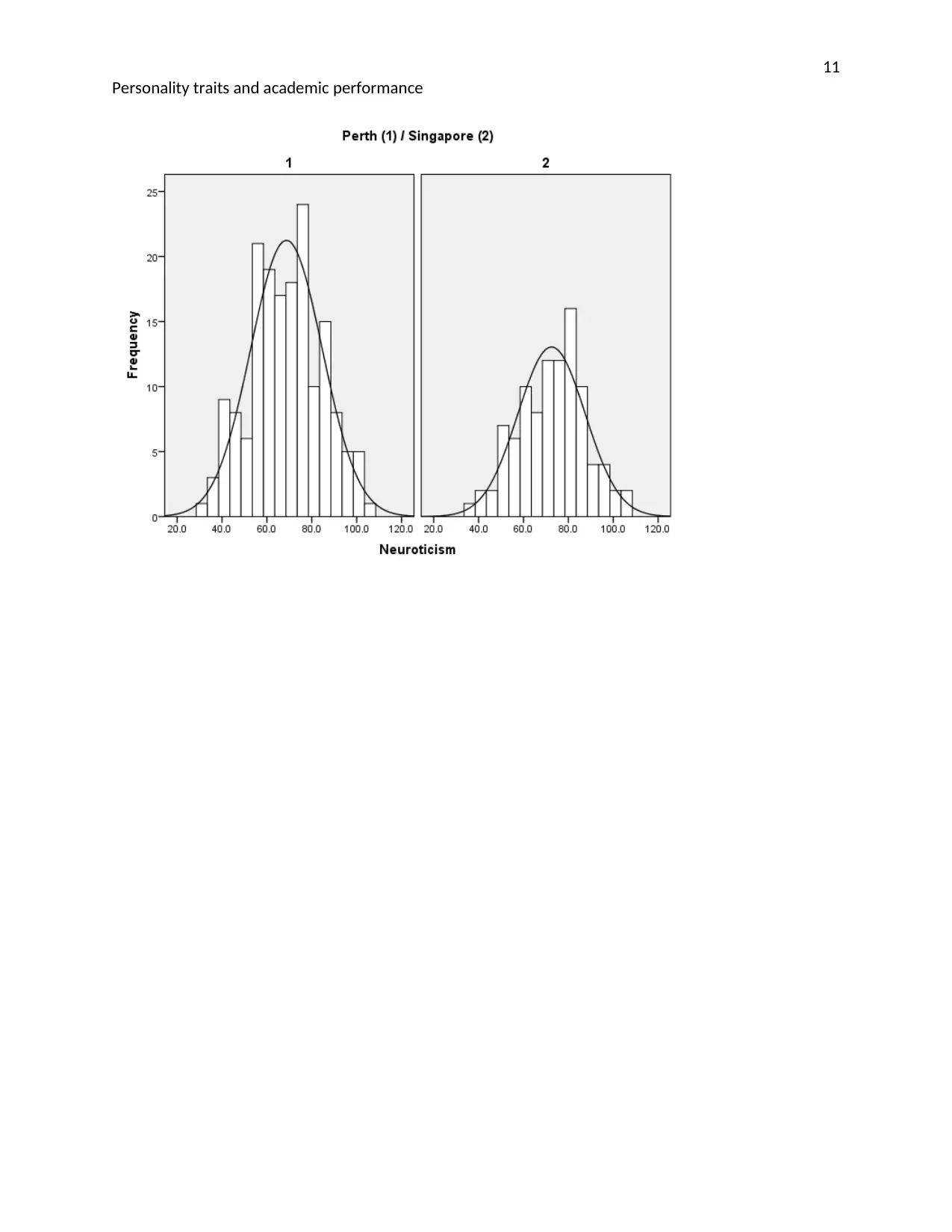
11
Personality traits and academic performance
Personality traits and academic performance
1 out of 11
Related Documents
Your All-in-One AI-Powered Toolkit for Academic Success.
+13062052269
info@desklib.com
Available 24*7 on WhatsApp / Email
![[object Object]](/_next/static/media/star-bottom.7253800d.svg)
Unlock your academic potential
Copyright © 2020–2026 A2Z Services. All Rights Reserved. Developed and managed by ZUCOL.





